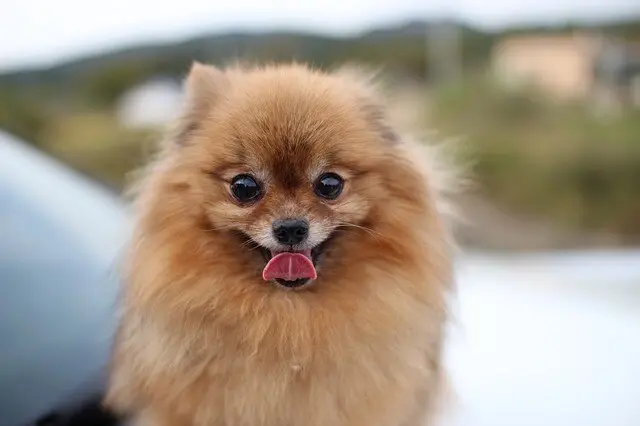
Hiccups in puppies can be caused by various reasons. Owners of young dogs and puppies often notice that their four-legged friends get hiccups after quickly gobbling down food. In addition, hasty drinking can trigger the gurgling noises. Sometimes hiccups in puppies appear out of nowhere. In most cases, this is harmless behavior. In rare cases, it can indicate illness in the young dog.
How do downward hiccups occur in dogs?
To understand what causes hiccups in puppies, it is helpful to take a closer look at how they occur.
An important organ that is involved in both hiccups and breathing is the diaphragm . It lies between the liver and the lungs and thus between the chest and abdominal cavities. When you breathe in, the diaphragm contracts and slides down a little. This happens so that the lungs have enough space to expand. When you breathe out, the diaphragm relaxes again and slides back up a little. If the diaphragm is disturbed during this process and begins to cramp, hiccups occur.
For example, high pressure caused by a full stomach can throw the muscle organ out of sync. As a result, not only does the diaphragm cramp, but the respiratory muscles also contract reflexively. At the same time, the vocal cords push in front of the glottis when the pressure is high. This creates the typical gurgling sound.
Why do puppies get hiccups?
Puppies get their first hiccups in the womb just like other mammals. This reflex probably helps them practice breathing before birth . Researchers are divided on the exact cause. Veterinarians agree on the reasons that lead to hiccups after birth.
These include:
- rapid gulping of food
- drinking quickly, especially cold water
- in very young puppies: swallowing air while suckling
- sudden excitement
- anxiety-provoking and stressful situations
- growth of the puppy
- in rare cases: diseases
Treating and Preventing Hiccups in Puppies
In most cases, the gurgling noises are over just as quickly as they came. So all you have to do is wait a moment and the hiccups will disappear. Since they are usually not dangerous, no immediate measures need to be taken. However, if other symptoms appear, you should consult a veterinarian.
To prevent hiccups, it is advisable to give the dog only small amounts of food . In any case, the Nutrition This is important for puppies. This protects the stomach and prevents excessive pressure on the diaphragm.
If your dog gulps down every bit of food very quickly, it makes sense to look for an anti-gulping bowl. In addition, through targeted training , your puppy can be taught to eat his food calmly and quietly.
Owners can also feed their dog by hand to teach him to eat slowly. This also strengthens the bond between humans and animals.
It is also helpful not to offer the dog ice-cold or very cold water . Room temperature is a guideline for the optimal drinking temperature. Here too, it is a good idea for the dog not to drink too much at once. If the dog is suddenly frightened, gurgling noises can be heard as a result.
To help the puppy, the same measures can be taken that help humans. Blowing on the dog’s neck or head area can cause it to pause for a moment and then its breathing returns to normal. This also happens when owners frighten the puppy. However, blowing on it is a slightly gentler method that in most cases achieves the same effect.
Puppy often has hiccups: sign of illness?
As already mentioned: hiccups, i.e. the reflexive contraction of the diaphragm, are a normal and harmless reaction of the body . As the puppy gets bigger, this phenomenon usually becomes less frequent. However, if the puppy hiccups very often or never stops making gurgling noises, a visit to the vet is recommended. The vet can examine the dog more closely to see if there is anything wrong with the dog.
In rare cases, tumors, abscesses or stomach ulcers can cause hiccups. Frequent hiccups can also be an indication of other diseases.
The diseases include:
- respiratory diseases
- pneumonia
- pericarditis
- asthma
- changes in the tissue
- Inflammation of the phrenic nerve (neuritis), the brain (encephalitis) or the meninges (meningitis)
- pancreatitis
- hiatal hernia
- poisoning
- heat stroke
- gastritis
There is a rumor going around among some dog owners that frequent hiccups are a sign of parasites in the body. Whether a dog has a worm infestation can be quickly determined by taking a stool sample from the vet. Worms are not a cause of hiccups , however . They can, however, cause what is known as worm cough.
Distinguish burping from hiccups
It is not immediately clear whether a puppy is burping repeatedly or is suffering from hiccups. In contrast to hiccups, frequent burping indicates an overly acidic stomach. If drooling, smacking or vomiting is noticed in addition to the gurgling noises, vigilance is required.
Owners should take their pet to the vet as soon as possible, especially if these symptoms occur regularly. The reason for frequent burping can be inflammation of the stomach lining. In addition, inflammation of the esophagus is indicated by increased burping.
Hiccups in puppies are usually harmless
The spasmodic contraction of the diaphragm is usually a normal physical process . Puppies and young dogs suffer from hiccups much more often than adult dogs.
In very rare cases, repeated hiccups indicate serious illnesses. If other symptoms occur, you should consult a veterinarian to be on the safe side.
Owners can take a few simple measures to protect their puppy from hiccups. In addition to feeding small portions of food, it is important to expose the puppy to as little stress as possible. This allows the puppy to mature into a young dog and later into an adult dog in a relaxed manner.